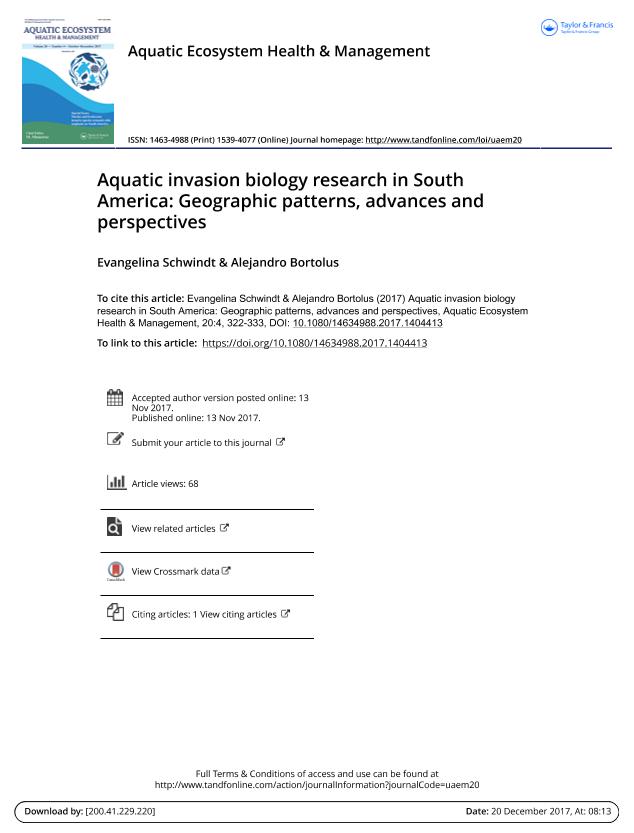Mostrar el registro sencillo del ítem
dc.contributor.author
Schwindt, Evangelina

dc.contributor.author
Bortolus, Alejandro

dc.date.available
2018-02-22T18:28:48Z
dc.date.issued
2017-10
dc.identifier.citation
Schwindt, Evangelina; Bortolus, Alejandro; Aquatic invasion biology research in South America: Geographic patterns, advances and perspectives; Taylor & Francis; Aquatic Ecosystem Health And Management; 20; 4; 10-2017; 322-333
dc.identifier.issn
1463-4988
dc.identifier.uri
http://hdl.handle.net/11336/36991
dc.description.abstract
In this work, we describe and discuss the current status, trends, and gaps for aquatic invasion research in South America, and we reveal the current state of multinational collaborations on these matters across the continent. First, to measure temporal change in the magnitude of invasion research for South America, we replicated a survey performed in 2001 for marine exotic species, using identical methods used back then to search publications in the Aquatic Science and Fisheries Abstracts database. Second, to compare the South America invasion research effort, in terms of the production of scientific literature on aquatic invasion biology, across time (years), countries, aquatic (freshwater, estuarine, and marine) environments, themes, and taxonomic groups, we performed a more comprehensive search of publications using multiple databases (Scielo, ASFA, Scopus and Google Scholar). This exhaustive survey included articles in international, regional and local peer reviewed journals on aquatic (freshwater, marine and estuarine) exotic species of SA that were published between 2004 and 2014 in the three dominant languages of South America. We found that the research effort for marine exotic species research in South America increased 9-fold between the two time periods (1997–2001 vs. 2002–2014), with most (90%) of recent research occurring in the Atlantic (vs. Pacific) coast. This disparity in research effort between coasts is consistently evident for individual environments (including freshwater, estuarine, and marine waters) and countries. While the focus of publications is unevenly distributed among research themes and taxa, the paucity of comparative analyses among countries is especially striking. Despite the general increment in research effort within the discipline, we consider there is an urgent need for more solid and concerted multinational efforts to address (financially, scientifically and socially) the conspicuous gaps in aquatic invasion research. Failing to make these efforts is probably the major threat hampering the development of successful long term programs and strategies directed to prevent, manage and/or control the introduction of exotic species and their many impacts in the continent.
dc.format
application/pdf
dc.language.iso
eng
dc.publisher
Taylor & Francis

dc.rights
info:eu-repo/semantics/openAccess
dc.rights.uri
https://creativecommons.org/licenses/by-nc-sa/2.5/ar/
dc.subject
Disciplinary Bias
dc.subject
Exotic Species
dc.subject
International Cooperation
dc.subject
Research Effort
dc.subject.classification
Otras Ciencias Biológicas

dc.subject.classification
Ciencias Biológicas

dc.subject.classification
CIENCIAS NATURALES Y EXACTAS

dc.title
Aquatic invasion biology research in South America: Geographic patterns, advances and perspectives
dc.type
info:eu-repo/semantics/article
dc.type
info:ar-repo/semantics/artículo
dc.type
info:eu-repo/semantics/publishedVersion
dc.date.updated
2018-02-22T14:31:10Z
dc.journal.volume
20
dc.journal.number
4
dc.journal.pagination
322-333
dc.journal.pais
Reino Unido

dc.journal.ciudad
Londres
dc.description.fil
Fil: Schwindt, Evangelina. Consejo Nacional de Investigaciones Científicas y Técnicas. Centro Científico Tecnológico Conicet - Centro Nacional Patagónico. Instituto de Biología de Organismos Marinos; Argentina. Grupo de Ecología en Ambientes Costeros; Argentina
dc.description.fil
Fil: Bortolus, Alejandro. Grupo de Ecología en Ambientes Costeros; Argentina. Consejo Nacional de Investigaciones Científicas y Técnicas. Centro Científico Tecnológico Conicet - Centro Nacional Patagónico. Instituto Patagónico para el Estudio de los Ecosistemas Continentales; Argentina
dc.journal.title
Aquatic Ecosystem Health And Management

dc.relation.alternativeid
info:eu-repo/semantics/altIdentifier/doi/http://dx.doi.org/10.1080/14634988.2017.1404413
dc.relation.alternativeid
info:eu-repo/semantics/altIdentifier/url/http://www.tandfonline.com/doi/full/10.1080/14634988.2017.1404413
Archivos asociados
